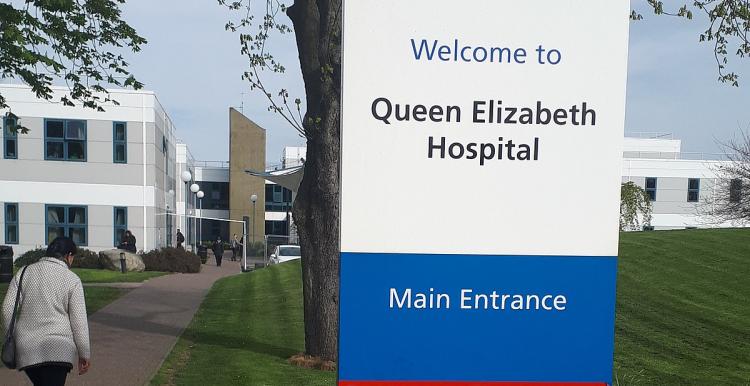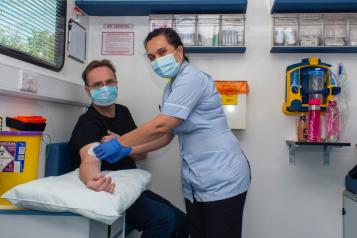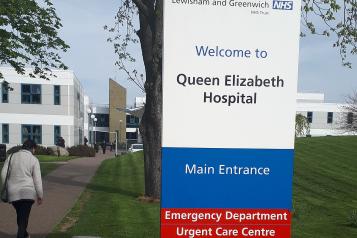DNACPR orders at Queen Elizabeth Hospital

Please note: The provider response to this report and a copy of the inspection report can be found at the end of this press release.
The Care Quality Commission (CQC) has told Lewisham and Greenwich NHS Trust to ensure that DNACPR policies at Queen Elizabeth Hospital, and supporting information relating to treatment escalation plans, must be recorded consistently.
CQC carried out an unannounced, focused inspection at Queen Elizabeth Hospital in December, after receiving information from a CQC national review that triggered concerns about the safety and quality of the services relating to DNACPR orders and the way in which they were completed and recorded. There were no ratings produced from this inspection.
Share your views
It only takes a minute to tell us about your experience of health and social care. We use your views to raise concerns with the people running NHS and social care services to make care better.
DNACPR stands for ‘do not attempt cardiopulmonary resuscitation’. Cardiopulmonary resuscitation (CPR) is a treatment that is used to try to restart a person’s heart and breathing when one, or both, has stopped. It means that if a person has a cardiac arrest or dies suddenly, there will be guidance in place regarding whether or not to perform CPR on them. Decisions about DNACPR are based on a person’s individual clinical assessments and made following consultation with the patient where possible and may involve their family.
DNACPR only specifies whether a person will receive CPR or not. Patients who are under a DNACPR order will still receive appropriate treatment for their health issues and all their personal care needs will be attended to. The treatment that will be given to a DNACPR patient must be recorded in the patient’s Treatment Escalation Plan (TEP).
National guidance states that records of decisions about CPR must be accurate and up-to-date. Recorded decisions about CPR should accompany a patient when they move from one setting to another.
CQC’s Head of Hospital Inspection for London, Nicola Wise, said:
“Queen Elizabeth Hospital had previously been using a paper-based system to record DNACPR orders and treatment escalation plans, but this has now been transferred to an electronic patient recording system. During our inspection, we found that there were some issues relating to the transfer of documentation to the electronic record software. This meant that there was some inconsistency in where information to support the DNACPR order was being recorded.
“However, we were pleased to see that the trust had identified the issues caused by the transfer of records and had put plans in place to ensure that these were addressed.
“We have now told the trust it must ensure that DNACPR orders are supported by treatment escalation plans which contain easily accessible and relevant information which is checked by senior clinicians to ensure they are in line with trust policies. It must also update the policy for treatment escalation plans to reflect changes made to the electronic patient recording system.
“The provider must now send a report to CQC outlining what action they will take in order to meet these requirements.”
During the inspection, CQC found:
- All the DNACPR orders that were checked were authorised or endorsed by a senior clinician and were available for healthcare professionals who may have needed to use them. Inspectors were told that there were no cases where the issuing of a DNACPR order was done incorrectly.
- However, there was some inconsistency in the way in which patient treatment escalation plans (TEP) were completed, and some were not in line with the trust’s TEP policy guidance.
- In some cases, records detailing discussions with the family and information relating to a patient’s care plan and other clinical decisions were not always documented in the TEP.
- Although staff reported that discussions were recorded in a patient’s medical notes, these were not easily accessible to inexperienced users.
There were also several positive findings:
- The trust had fully implemented an electronic patient recording system since the previous inspection and all DNACPR orders were now contained in each patient’s record.
- Staff felt adequately trained and supported to use the electronic system and had sufficient terminals to access the software.
- The trust had also worked hard to improve its compliance with safeguarding training, so much so, that divisional compliance results exceeded the trust’s target of 90%, a significant improvement following the previous inspection.
- The trust also shared evidence of audits relating to DNACPR orders, safeguarding training and treatment escalation plan policies.
Full details of the inspection are given in the report published online.
Lewisham and Greenwich NHS Trust press release in response to CQC report
During an unannounced CQC inspection at Queen Elizabeth Hospital in December 2020, inspectors found that there was some inconsistency in where information to support DNACPR orders was being recorded.
DNACR stands for ‘Do not attempt cardiopulmonary resuscitation’. Cardiopulmonary resuscitation (CPR) is a treatment that is used to try to restart a person’s heart and breathing when one or both has stopped. Decisions about DNACPR are based on a person’s individual clinical assessments and made following consultation with the patient (where possible) and their family.
At the time of the inspection, the Trust had recently transferred its patient records from a paper based system to an electronic system, which resulted in some inconsistency in where discussions with families were recorded. The Trust had already identified this issue and is in the process of updating its electronic patient records system to improve alerts and enable clinicians to easily record discussions with loved ones in a place that’s easily accessible to other clinicians involved in the patient’s care.
The Trust is also updating its Treatment Escalation Policy (TEP) and its DNACPR policy to reflect the changes to our electronic patient records system.
At no point has patient care been affected by the inconsistencies in the recording of family discussions, and there were no cases where the issuing of a DNACPR order was done incorrectly.
Downloads
If you need this information in an alternative language or format, please email info@healthwatchgreenwich.co.uk or call 020 8301 8340


